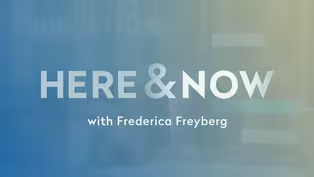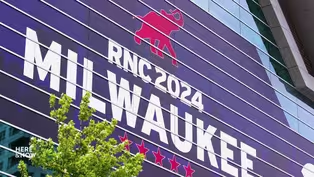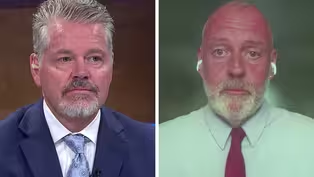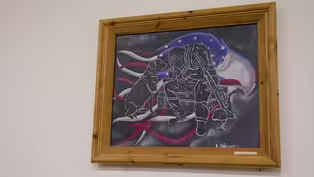Here and Now
Here & Now for August 1, 2025
Season 2400 Episode 2404 | 26m 49sVideo has Closed Captions
Watch the entire episode of Here & Now for August 1.
Watch the entire episode of Here & Now for August 1.
Problems playing video? | Closed Captioning Feedback
Problems playing video? | Closed Captioning Feedback
Here and Now is a local public television program presented by PBS Wisconsin
Here and Now
Here & Now for August 1, 2025
Season 2400 Episode 2404 | 26m 49sVideo has Closed Captions
Watch the entire episode of Here & Now for August 1.
Problems playing video? | Closed Captioning Feedback
How to Watch Here and Now
Here and Now is available to stream on pbs.org and the free PBS App, available on iPhone, Apple TV, Android TV, Android smartphones, Amazon Fire TV, Amazon Fire Tablet, Roku, Samsung Smart TV, and Vizio.
Providing Support for PBS.org
Learn Moreabout PBS online sponsorshipThe following program is a PBS Wisconsin original production.
>> After a whopping victory, an investiture.
Judge Susan Crawford sworn in as justice on the Wisconsin Supreme Court.
And a final audit of the just passed state budget shows a billion and a half dollars in tax cuts, along with spending hikes.
[MUSIC] I'm Frederica Freyberg.
Tonight on "Here& Now" a veterans housing and recovery program at risk.
Our political panelists give their take on a toss up governor's election.
And we continue our series Rx Uncovered looking at a prescription coupon that leaves some paying more.
It's "Here& Now" for August 1st.
>> Funding for here and Now is provided by the Focus Fund for Journalism and Friends of PBS Wisconsin.
>> First tonight, more than 350 military veterans are homeless in Wisconsin.
According to the latest estimates, some are getting a fresh start through the Veterans Housing and Recovery Program, which offers job training and support for addiction.
But the program is now at risk after falling short of the funding it needed in the new state budget.
That's a concern for the veterans who rely on these services today, and for those who will need them in the future.
But as "Here& Now", reporter Steven Potter tells us, there are hopes new bipartisan legislation could restore funding and keep the program running.
>> It's like I developed all these bad habits with my anger and drinking, and I ended up in a shelter again.
>> Michael Cable is a veteran of the United States Navy.
He's also been homeless many times first as a child, then as a young adult.
And then he became homeless again after leaving the Navy in 2010.
>> Came back.
I was a full blown alcoholic and anger.
Just couldn't deal with my emotions at all.
>> Struggling to deal with life after the military.
>> You come back and it's like your life's gone.
Everything's changed.
>> He knew something drastic needed to happen.
And it did.
>> Once I got sober, I felt so much different about everything.
I used to dream about everything all the time.
And now I was actually doing things, working towards those dreams.
>> What changed is that Michael was accepted into the state's veterans Housing and Recovery Program at the Chippewa Falls location, known as Klein Hall.
Graduating from that program in May, he got hired at a local plastics factory.
And then all of his hard work paid off.
As this formerly homeless veteran became a homeowner.
>> I literally bought the first house I seen.
I gave him a full price offer and moved in, and I.
Every day I'm just standing there like, I can't believe it.
It's amazing.
>> Since opening in 2007, Klein Hall has helped roughly 1000 of Wisconsin's homeless and at risk military veterans find their footing and eventually secure permanent housing.
And while Michael is one of the success stories, he could also be one of the last veterans to use the Transitional housing and Recovery program due to a lack of funding in the new state budget.
Klein Hall in Chippewa Falls and another similar location in green Bay are slated to close their doors at the end of September.
>> We were really saddened and disappointed with the budgetary decisions.
It's a horrible situation.
>> The Veterans Housing and Recovery Program is run by the Wisconsin Department of Veterans Affairs.
Out of three locations.
Assistant Deputy Director Joey Hoey says they now only have enough money to keep one site open.
>> So we made some very difficult and agonizing decisions.
We've decided that we're going to focus our efforts on one of the three sites.
It's in Union Grove down by Milwaukee.
>> Politically, Democratic Governor Tony Evers has blasted Republicans in control of the state budget writing committee.
In a statement, Evers said, quote, there will now be fewer options for homeless veterans as a result of the legislature's irresponsible decision to reject the investments that I proposed.
Joint Finance Committee Chairman Senator Howard Marklein and Representative Mark Born responded by saying the governor failed to make this program a funding priority during budget negotiations.
And they added that the governor was, quote, looking for a scapegoat to blame for his administration's failure to adequately manage the changes to the program volume and demands.
>> Who cares?
Who cares whose fault it is?
That doesn't help the problem.
>> For veterans like Derek Aune, who first heard about it in prison.
This program is not only transitional, but it can also be transformative.
>> I'm learning all the time about this mental health stuff is I do not do regular life well, but I know that if I want to stay out of prison, then I have to be willing to do stuff like this because it's the best way for me to keep myself like in the right frame of mind.
>> Discharged from the Marines 20 years ago.
Derrick has been homeless several times over the years at Klein Hall.
He says he's found stability and he's been allowed to keep his emotional support animal, a friendly, attentive, husky mix named Phoenix, with him.
He appreciates that the program here is built specifically and only for veterans.
>> That makes a big difference.
And you'll hear that from almost every veteran across the board.
With any situation, whether it's treatment or groups or whatever.
There it is a different feeling when you're amongst other veterans.
>> Randy Withrow is the Klein Hall site director for Lutheran Social Services, which contracts with government veterans affairs agencies to manage the program.
>> Nobody's homeless because they don't have shelter.
It is a myriad of things that occur in their lives, whether it be legal, mental health, substance abuse, financial that leads them to homelessness.
And part of our job is to make sure that we shore up those areas so that then when they become either renters or owners, that they have the skills and the ability to handle that day to day living that you and I may take for granted.
>> Veterans stay in the program for a maximum of two years and participate in employment and education training.
They receive meals and transportation assistance and are also required to maintain absolute sobriety.
Program staff members are working to place veterans currently in the program in other housing initiatives, or to move them to the Union Grove location that's staying open.
But there is concern that if too much changes, some veterans will end up back on the streets.
>> Change is not something that they necessarily experience well, and now they've got to go and meet a new group and interact and integrate into something that's different.
>> Veterans affairs officials say there is still hope that the two housing program locations, scheduled to close in September, could be saved if new funding is secured soon and there is legislation being circulated at the state Capitol to do just that.
>> If we were to get funding, we could quickly restart the program.
>> With two of the three locations closing.
The overall program will shrink considerably from more than 100 beds total to just 40 beds at the Union Grove location, veterans say keeping the program running is a necessity.
>> These kind of things are pivotal.
If you don't want to have people rolling back through the system over and over and over again.
>> Just having a place where you can catch your breath and really get back your sanity doesn't take much.
Just a place to stay.
Some food and a counselor.
Someone cares.
Someone you talk to, life changing.
These guys are grateful for every bit of it.
>> Reporting from Chippewa Falls.
I'm Steven Potter for "Here& Now".
>> With Democratic Governor Tony Evers announcement that he will not run for a third term, the November 2026 election for governor is wide open, and already candidates are lining up on the Republican side.
Whitefish Bay businessman Bill Berrian and Washington County Executive Josh Shewman have entered the race.
Democratic Lieutenant Governor Sarah Rodriguez is also formally declared.
Now, there are a whole lot more names potentially throwing their hat in the ring.
For more on this, we turn to our political panelists, Republican Bill McCoshen and Democrat Scot Ross.
Nice to see you both again.
>> Great to be with you.
So good to be here.
>> Bill, what kind of opportunity is this for Republicans?
the second time in my 60 years on this earth where we've had an open gubernatorial seat.
2010 was the last time Scott Walker beat Milwaukee Mayor Tom Barrett.
So the fact that it's an open seat is an opportunity for Republicans to actually win here, both of the national prognosticators, whether it's the Cook Political Report or Larry Sabato's Crystal ball, moved this race from lean Democrat as soon as Tony Evers made his announcement to toss up.
So it's an opportunity for the Republicans to potentially take back the governorship in 2026 here in the state of Wisconsin.
toss up kind of status, how would policymaking change if, in fact, a Republican were to win?
>> Well, I mean, obviously, if the Republican Party, which is wholly controlled by Donald Trump, were to win the gubernatorial election and Democrats not pick up either of the chambers, it would be the most radical, extreme.
Partisan handout to special interests and corporate and the wealthy that we've ever seen in the history of Wisconsin.
But I think that you have to look beyond, you know, the sort of toss up numbers when it comes to the Cooke.
Yeah.
On on you know, if you look at it on face Wisconsin, you know, goes back and forth.
But if you look at the real numbers and where the Republican Party is right now, you know, if you're not Donald Trump, the party has Wisconsin voters have elections.
Election after election after election.
And we I think we've only had two of any consequence that have gone Republican in the last like 15 years.
Ron Johnson, of course, who got in there because, you know, the D triple DS abandoned Mandela Barnes and he was racist third party ads.
And, and, and the Supreme Court race where they just, you know, they were Democrats quite didn't quite, hadn't quite figured out how to lock up those races yet.
Now it's a completely different universe.
And the Republican Party, with Donald Trump in full control of the government, isn't getting more open for isn't getting more accommodating for swing voters?
>> Bill, as to the Washington influence, seventh Congressional District Republican Tom Tiffany has been talking about running for a long time.
What's he waiting for?
>> He says he's going to make a decision sometime around Labor Day.
I hope he does it sooner than that.
There are several congresspeople in in the House now that are running for governor and different states.
Byron Donalds being at the top of the list in Florida.
I think the president's a little concerned about that, House, the GOP majority in the House, is so slim to begin with.
So I don't know if Tom Tiffany is going to get in if he's got a lot of strong suits, for sure, but is fundraising.
He's got $125,000 cash on hand, which today and Scott would agree.
That's a good assembly race.
That's not a gubernatorial race.
So fundraising is his biggest shortcoming.
We'll see if he gets in.
At the end of the day, where Scott and I actually do agree, Donald Trump's going to pick the winner of this primary, whoever he endorses in this primary will win the race for sure.
On our side.
>> Who else are Republicans looking at, Bill?
I mean, there's there is a long list of people out there.
>> Well, other names that are being bandied about are State Senator Mary Felzkowski, who comes from roughly the same geography as Tom Tiffany.
She represents the 12th Senate district up north.
If she won't get in, if Tiffany does get in.
But if Tiffany doesn't get in, I would expect to see her join the race.
You might remember she voted against the state budget.
She's the first Senate president to ever vote against a state budget.
Eric Hovde name still gets talked about, and I think there's a player to be named later again, because it's an open seat.
It's a real opportunity.
So I think there's probably somebody on our side that people aren't talking about yet who could get in this race.
Remember, we got 375 days between now and the August 11th, 2026 primary.
>> I'm sorry.
I just want to say, like, I think the reason, you know, part of the part of the challenge is the Republicans have, in contrast to the Democrats, is that they're two Republicans have no experience.
I mean, you know, you know, God bless Washington County, but it's not even one of the top ten largest counties in Wisconsin.
Whereas on the very long list of people with credentials who have delivered for the people of Wisconsin, starting with the gotten $750 million back from opioid settlements, something that the previous Republican administration and previous Republican attorney general refused to allow us to get.
You've got the county executive in the state's largest county.
David Crowley, you've got state Senator Kelda Roys, who's, you know, who's on the Joint Finance Committee and who's run a couple times before.
You know, there's a long list of people with real credentials about doing the things that mention was Ben Wikler, former party chairman.
than Ben Wikler.
He is the best fundraiser on their side or our side.
So if he decides to get in, he'll be formidable.
Scott?
>> Oh, absolutely.
Yes.
I mean, Ben's a great guy who's traveled around the state doing the rubber chicken circuit, you know, for years.
I mean, it's a reason why a lot of us thought in 2022 that Rebecca Kleefisch was going to be the nominee for the Republicans, but the they don't want to have a woman at the top of the ticket.
So they went with an out of state businessman who lost.
status of the governor's race.
How much confidence, though, does the most recent ten point victory of Justice, Susan Crawford, give Dems?
>> Well, there are two different races, but it also shows that Democrats are able to have been able to mobilize their voters in a way that Republicans simply have not been able to do for a very, very long time.
Again, they've lost.
They've won a couple statewide elections.
But the margins, percentage wise and number wise, are so much more narrow than the blowouts that the Democrats have been able to do, because, again, they're talking about the They want to make sure that people are protected.
They want to make sure that abortion rights are some cases, you know, they want to make sure that when you go into court that you have your day in court and it's not balanced towards different to what the agenda of the of the Republicans are most embodied by the fact that, you know, we've got this big bad bill which is now going to bankrupt, you know, the country, you know, kicked 270,000 Wisconsinites off of their health care, you know, snatch snap benefits, you know, literally take the, the, the food out of out of babies and children.
That's the agenda of the Republicans.
And Democrats and contrast with what we're trying to do.
>> I wanted to just jump to the next Supreme Court election.
And have you described the stakes of that?
>> Well, we have Rebecca Bradley, who hasn't decided whether she's going to seek reelection or not on her most recent finance report.
She hadn't raised any money.
My advice to her is, if you're not going to run, get out and give people time to raise money.
I think one of the dynamics that there's a relationship between the two races, I don't think the Supreme Court race is going to be as hotly contested as the last two were.
I don't think it will be a $100 million race because it isn't for the majority.
I race, now that it's an open seat, will be the political Super.
Bowl in Wisconsin in 2026. appeals court Judge Chris Taylor is running for Supreme Court.
How formidable is she?
>> I think she's an incredibly formidable candidate and has built her career on protecting the rights of people in Wisconsin.
You know, whether it is for living with dignity or abortion rights or whatever, you know, just that's the that's the that is the profile profile that she has, the record that she has.
And especially as a judge.
And you know, that contrast, again, with Rebecca Bradley, who was one of the most divisive, one of the most noxious elected officials that we've had in the history of the state of Wisconsin.
And I think, you know, for her, what's you know, the problem is, if she's waiting for a federal incentive to taking out the incumbent from a judicial race when, by and large, over decades?
And Bill agree with this, the incumbent wins almost used to be unheard of, that almost 100% judicial candidate wouldn't win.
Yeah.
>> All right.
We need to leave it there.
But really nice to see you both again.
We'll have you on more now that we're heating up into this next election cycle.
Thank you.
>> Thanks.
>> Great to be with you.
>> Leftover money from the RNC in Milwaukee brings welcome news for nonprofits in the city.
The Milwaukee 2024 Host Committee announced this week a $5 million donation to multiple local charities.
That money comes from the remaining funds that were raised to support last summer's Republican National Convention in Milwaukee.
The donations will go to organizations that focus on youth, veterans and shelters like Sober living and halfway houses.
Turning to health care, we continue our coverage of prescription drugs as drug prices for patients go up, health insurance coverage of them goes down.
In our series Rx Uncovered Here and Now, producer Marissa Wojcik unpacks why this is happening and the impact it's having on patients.
In tonight's story, we look at how health plans use accumulators to divert financial aid away from patients in need.
>> I couldn't believe what I found out when this happened.
I couldn't believe it was legal.
>> Tamra Varebrook lives conditions.
She can still live her life as long as she has her medication.
>> I changed jobs and started over with a new copay and new deductible.
That's when this hit me, I wasn't getting my medications.
And you know, I thought, what?
Why aren't you sending them?
They're like, well, you have a $6,000 balance.
I had my first experience with copay accumulators.
I had never even heard of him.
>> A copay accumulator sounds like an obscure insurance term, and it is.
>> And I know people don't understand this.
If this doesn't directly affect them.
>> It's also a growing trend among health plans for Tamara's conditions.
Her medication costs her the equivalent of buying a car every year.
>> Right now, I take the entire prior year to save up, to try to have enough to buy my drug in January.
It's ridiculously expensive, but it's the thing that makes me be able to walk in my arms, bend and, you know, keep, you know, my joints moving so I don't end up in a wheelchair.
>> To afford her drugs, her doctors told her about patient assistance programs.
It's often the drug manufacturer helping the patient to afford their own high priced medication.
This kind of financial assistance is referred to as a copay, coupon or copay card.
>> That were meant to help the patients get their drugs and pay down their deductibles, pay down their, you know, on their out-of-pocket maximums.
>> Here's how they work a patient is prescribed an expensive name brand drug that doesn't have a generic.
Their health plan has a high deductible and out-of-pocket maximum, which they must meet before the plan will cover the drug.
The copay card provides the financial assistance to cover the patient's deductible and out-of-pocket max.
When those are met, the health plan kicks in and covers all or part of the cost that remains of the drug, potentially saving the patient thousands of dollars.
>> It was a life changer.
I was, you know, pretty low income at the time when a lot of my medical issues started and I would never have been able to afford these medications.
>> One day, she realized she wasn't receiving the life changing assistance or her medication.
Tamara was blindsided.
>> They weren't shipping it.
And so I kept calling and saying, well, why isn't this shipping there?
Like, you owe $6,000.
And I'm like, what do you mean I owe $6,000?
>> The drug company had provided the copay card.
>> I've already gotten this.
And you know, it should be my deductible.
At least should be covered.
>> The problem was the financial assistance no longer covered her.
The pharmacy told her.
>> If you don't pay for it in full, you are not getting your medication.
And I went months without.
>> Tamara had recently started a new job where her health plan contained a copay, accumulator.
>> I spent countless hours on phone calls.
I can't even tell you how upsetting it was.
>> The accumulator is a relatively new tool used by health plans and pharmacy benefit managers.
A copay accumulator takes the financial assistance, the copay card, and only applies it to the total cost of the drug.
It does not count towards the patient's deductible or out of pocket maximum.
In other words, the patient no longer saves money.
The health plan saves money by taking the full amount of the copay card and still collecting the deductible and out-of-pocket maximum paid by the patient.
>> This is a very scary moment for me, just knowing a lot of other people with Mis.
>> Jim Turk has multiple sclerosis or Ms, a disease that attacks the body's nerves.
There's no cure, only treatment.
>> If you're on drugs, I mean, that's your lifeline.
That's something that's preventing that, or at least slowing that down significantly from happening.
So they don't have as much stress in their life either.
And the stress in their life can also exacerbate the symptoms.
So it's just this vicious circle.
>> He's an advocate for people with Ms. Knowing the struggles firsthand.
>> I look at a list to see what all the drugs cost.
Ocrevus the one that I was on last, which was actually the newer drug, was one of the cheaper drugs.
And that was, I think, 70 or $80,000 a year, which I can't afford.
I'm on disability.
>> Having been the recipient of copay cards.
He stresses their importance for patients to survive.
>> You have to make the choice between paying for your drugs.
That might be a lifesaver or paying for groceries.
And obviously, there's no choice there.
Or paying for rent.
And that's really what it comes down to.
>> And a copay accumulator.
>> They're essentially designed to be confusing.
>> Makes that choice even harder.
>> I thought, Holy cow.
Well, in 21 states it is now illegal, but not Wisconsin.
>> Other states have outlawed accumulators, and a bill currently in Wisconsin's legislature would as well.
At a hearing, health plans and pharmacy benefit managers spoke in opposition.
control the soaring prices of prescription drugs set by pharmaceutical manufacturers, but instead rewards drug makers for steering patients towards more expensive brand name drugs.
a ploy by pharmaceutical companies to get patients to take expensive name brand drugs.
>> Rather than benefiting those in financial need.
A lot of these coupons from manufacturers act as an inducement to move to higher cost products.
>> Supporters of accumulators say they lower costs by saving health plans money, not just one patient, but others refuted these claims.
assistance programs from manufacturers are for drugs with no generic alternatives.
The copay assistance increases medication adherence.
Studies have found that morbidity and mortality associated with poor medication adherence cost the US healthcare system $528 billion annual Nonadherence can lead to treatment failure, resulting in poor outcomes such as worsening of condition, admission to the emergency room and hospitalization, and requiring new prescriptions to treat subsequent comorbidities, which results in higher cost to the entire health care system.
That is what will increase premiums.
>> This rings true for Tamra.
>> The specific drug is not the only cost of chronic disease.
Chronic disease causes people to miss work, end up in emergency rooms, hospital bills.
>> Drug manufacturers do not like accumulators because the assistance doesn't go to help the patient.
She fears they may end up not providing the assistance at all.
>> I'm afraid that the pharmaceutical companies stop the programs because they're not helping the patients, and that would be a real nightmare because then everybody would suffer.
This is where we're at in Wisconsin now, and I feel bad for everybody who has a child or, you know, any adult that runs into these issues because most people are not prepared with that kind of money, and you aren't going to get your medication.
>> Reporting from Germantown I'm Marisa Wojcik for "Here& Now".
>> For more on this and other issues facing Wisconsin, visit our website at PBS Wisconsin.
Org and then click on the news tab.
That's our program for tonight.
I'm Frederica Freyberg.
Before we go, I'd like to acknowledge and say goodbye to one of our reporters.
Aditi Debnath joined us in 2023.
She's been a great asset.
Now she's on the move.
Today is her last day at PBS Wisconsin.
We wish her all the best.
Have a good weekend.
[MUSIC] >> Funding for here and Now is provided by the Focus Fund for Journalism and Friends of PBS Wisconsin.
Here & Now opening for August 1, 2025
Video has Closed Captions
Clip: S2400 Ep2404 | 1m 2s | The introduction to the August 1, 2025 episode of Here & Now. (1m 2s)
How Copay Accumulators Affect Patient Access to Medications
Video has Closed Captions
Clip: S2400 Ep2404 | 8m 24s | Many patients are encountering an accounting tool that redirects savings from copay cards. (8m 24s)
Leftover 2024 Milwaukee RNC Money to be Donated to Charities
Video has Closed Captions
Clip: S2400 Ep2404 | 31s | The MKE 2024 Host Committee announced that over $5 million was donated to local charities. (31s)
McCoshen & Ross on Wisconsin's 2026 Governor's Race Forecast
Video has Closed Captions
Clip: S2400 Ep2404 | 8m 42s | Bill McCoshen and Scot Ross on the outlook for the 2026 race for governor of Wisconsin. (8m 42s)
Veterans Hope Wisconsin Will Restore Homeless Program Funds
Video has Closed Captions
Clip: S2400 Ep2404 | 7m 24s | Legislation would restore funds to transitional housing facilities for homeless veterans. (7m 24s)
Providing Support for PBS.org
Learn Moreabout PBS online sponsorship
- News and Public Affairs

Top journalists deliver compelling original analysis of the hour's headlines.

- News and Public Affairs

FRONTLINE is investigative journalism that questions, explains and changes our world.












Support for PBS provided by:
Here and Now is a local public television program presented by PBS Wisconsin




